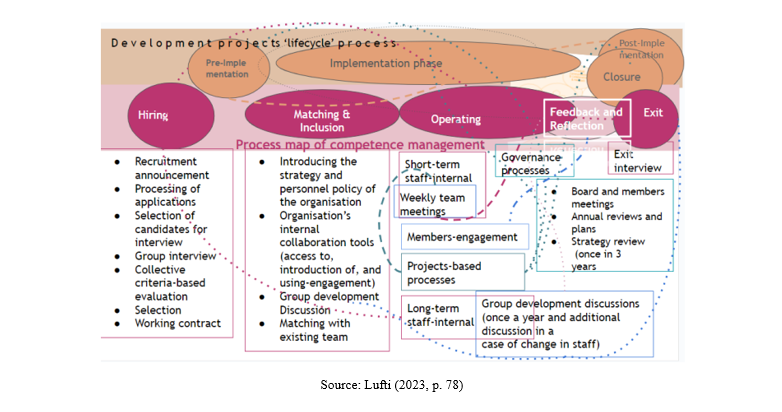Gathering and applying new competencies in an organisational setting, such as knowledge and skills, requires an open mind and cognitive efforts of team members. The aim of this exercise is to improve the management process in organizations, by focusing on continuous learning but also – when needed – unlearning of the old knowledge that does not serve us well.
 Photo by Edz Norton on Unsplash
Photo by Edz Norton on Unsplash
Master’s thesis by Evilina Lutfi focuses on the improvement of the competence management process in the case organisation Green Net Finland (GNF), which has been her workplace for over one and half decades. GNF is a non-profit membership-based association of public organisations and private enterprises. The main activities of the GNF include environmental sustainability-focused development projects for the general benefit of society. The nature of their work involves multitasking in parallel projects and different phases of the project lifecycle.
The purpose of the thesis was to align the managerial, developmental, and personnel competence processes of GNF to improve their efficiency. The development task consisted of two levels – a working community level and an individual part. The primary and direct beneficiary of the thesis is the case organisation and indirect beneficiaries are envisioned micro-size non-profit and network-based organisations operating in a similar context as the case organisation, namely Green Transition through Regional Development Projects.
The theoretical framework of the thesis explored a broad range of relevant and interconnected topics, including sustainability and cognitive aspects, related to a process of sustainability dissonance harmonization (Weder et al., 2020); the meaning of competencies and learning on an individual and organisational level (Sweller, 1998); the importance of intergroup relationships, social learning and norms (e.g., Michie et al., 2014), as well as heuristics processes and biases in decision-making (Bazerman & Moore, 2012). The theoretical basis on different approaches to strategy, innovation, and leadership styles (see e.g., Senge, 2006) have also been reviewed and utilized in developing recommendations for GNF’s strategy revision.
The main output from the working community-level part is presented as a lifecycle-based process map of competence management in GNF (see Figure 1). The main conclusion is that collective-level learning culture and accumulation of teamwork and problem-solving skills in small groups could help to decrease the cognitive load on the working memory of individuals, improve the psychological safety atmosphere within groups, and as a result of a team performance effectiveness, leave space for nurturing personal mastery skills.
Finally, Lufti (2023) encourages individuals to draw a visualization of their organization’s internal structure, connecting it to the changes in the external environment. Once this has been mapped, it is recommended to use the map as an approach to revise the organisational strategy. Drawing maps of processes and concepts is generally recommended for collective-level developing, learning, revisioning, sense-making, and innovating discussions. Drawing a competence map at the individual level is thus encouraged for objectively seeing the existing and future competence and connections between the elements within the overall competence map. Finally, comparing the individual’s competence map with organisation’s alignment map is recommended, especially when providing feedback and feedforward group development discussions.
 Figure 1. Project’s lifecycle process map of competence management in GNF (Lufti 2023, 78)
Figure 1. Project’s lifecycle process map of competence management in GNF (Lufti 2023, 78)
This paper is based on Evilina Lutfi’s thesis on the Improvement of competence management process by lifecycle and alignment approaches: the case of a non-profit organisation Green Net Finland. The thesis is part of Laurea’s Master’s degree programme in Leading Transformational Change and provides insights for the improvement of efficiency of competence management processes in project-based organizations. This topic is related to the academic interest and expertise of Evilina’s supervisor, Dr. Nikolina Koporcic. Relevant studies related to the topic can be found in her latest edited book: Approaches to Corporate Social Responsibility: Knowledge, Values, and Actions, published by Routledge in 2023.
About the authors
Evilina Lutfi has a passion for sustainability, learning, knowledge, and new skills. She has 17+ years of experience in developing and implementing projects related to resource and energy efficiency, quality of living environment, human-to-human communication, and cluster-to-cluster collaboration. Evilina’s interests, intents, and efforts are related to sustainable business, SDGs, and ESG. She is graduating with an MBA from the Laurea University of Applied Science in September 2023 and working as a development manager at Green Net Finland since 2006.
Dr. Nikolina Koporcic (Ph.D. in Economics and Business Administration) is a Principal Researcher at Laurea University of Applied Sciences and an Academy Research Fellow at the Academy of Finland. Nikolina also holds the title of a Docent (Adjunct Professor) at the University of Turku and acts as an Associate Editor of Business Ethics, the Environment & Responsibility Journal. Her research areas include the co-creation of value, open innovation, corporate branding, entrepreneurship, business relationships and networks. In particular, she is studying the importance of Interactive Network Branding for small firms in business markets. Nikolina has published 16 peer-reviewed academic articles, 3 books, 8 book chapters, 22 conference proceedings, and 10 Laurea Journal articles. orcid.org/0000-0001-5050-3819
Reference list:
- Bazerman, M. H., & Moore, D. A. 2012. Judgment in managerial decision making. John Wiley & Sons.
- Markovic, S., Lindgreen, A., Koporcic, N., & Micevski, M. (Eds.) 2023. Approaches to Corporate Social Responsibility: Knowledge, Values, and Actions. Routledge.
- Michie, S., West, R., Campbell, R., Brown, J., & Gainforth, H. 2014. ABC of behaviour change theories: an essential resource for researchers. Policy Makers and Practitioners, 402.
- Senge, P. M. 2006. The fifth discipline: The art and practice of the learning organization. Broadway Business.
- Sweller, J. 1988. Cognitive load during problem solving: Effects on learning. Cognitive science, 12(2), 257-285.
- Weder, F., Tungarat, A., & Lemke, S. 2020. Sustainability as cognitive “Friction”: A narrative approach to understand the moral dissonance of sustainability and harmonization strategies. Frontiers in Communication, 5, 8.
Web sources: